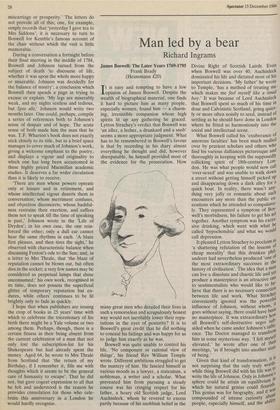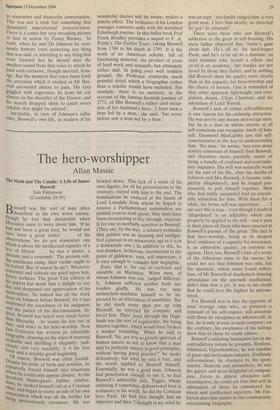Man led by a bear
Richard Ingrams
James Boswell: The Later Years 1769-1795 Frank Brady (Heinemann £20)
It is easy and tempting to have a low opinion of James Boswell. Despite the wealth of biographical material, one finds it hard to picture him as many people, especially women, found him — a charm- ing, irresistible companion whose high spirits lit up any gathering he graced. Lytton Strachey's verdict that Boswell was 'an idler, a lecher, a drunkard and a snob' seems a more appropriate judgment. What has to be remembered in Boswell's favour is that by recording in his diary almost everything he thought and did, however disreputable, he himself provided most of the evidence for the prosecution. How
many great men who detailed their lives in such a remorseless and scrupulously honest way would not inevitably lower their repu- tations in the eyes of posterity? It is to Boswell's great credit that he did nothing to conceal his failings and was happy for us to judge him exactly as he was.
Boswell was quite unable to control his life. No composure or rational view of things', his friend Rev William Temple wrote. Different ambitions struggled to get the mastery of him. He fancied himself in various moods as a lawyer, a statesman, a nobleman, a writer and a scholar. What prevented him from pursuing a steady course was his cringing respect for his father, a hoary old Scottish judge, Lord Auchinleck, whom he revered to excess partly because of his snobbish belief in the Divine Right of Scottish Lairds. Even when Boswell was over 40, Auchinleck dominated his life and dictated most of his important decisions. 'My father' he wrote to Temple, 'has a method of treating me ' which makes me feel myself like a timid boy.' It was because of Lord Auchinleck that Boswell spent so much of his time in dour and Calvinistic Scotland, going quiet- ly or more often noisily to seed, instead of settling as he should have done in London where he fitted so harmoniously into the social and intellectual scene.
What Boswell called his 'exuberance of amorous faculties' has been much mulled over by prurient scholars and others who find his various dalliances picturesque and thoroughly in keeping with the supposedlY rollicking spirit of 18th-century Lon- don. He was what people would now call 'over-sexed' and was unable to walk down a street without getting himself picked up and disappearing down a dark alley for a quick bout. In reality, there wasn't any- thing very jolly or romantic about such encounters any more than the public ex" ecutions which he attended so compulsive- ly. They represented a symptom of Bos- well's morbidness, his failure to get his act together. Another symptom was his execs" sive drinking, which went with what he called 'hypochondria' and what we would call depression. It pleased Lytton Strachey to proclaim as 'a shattering refutation of the lessons of cheap morality' that this drunken Oil; anderer had nevertheless produced 'one 01 the most extraordinary successes in the history of civilisation'. The idea that a mall can live a dissolute and chaotic life and yet produce a masterpiece is an attractive one to sentimentalists who would like to be lieve that there is no necessary connection between life and work. What StracheY, conveniently ignored was the powerfn.; influence of Johnson, without whom, I` goes without saying, there could have beell no masterpiece. It was extraordinary 111 all Boswell's self-destructive urges so' sided when he came under Johnson's infl°- ence. The Doctor managed to transforinf him in some mysterious way. felt mYse!, elevated,' he wrote after one of the meetings, 'as if brought into another state of being.' Given that kind of transformation, it hi5 not surprising that the only truly wort,"0- while thing Boswell did with his life was write the life of Johnson. Only in Johnson.' sphere could he attain an equilibriurn which his natural genius could flow-in This genius was for biography, and it v'f°t compounded of intense curiosity ah„ people, especially himself, and the abi
to remember and transcribe conversation. This was not a trick but something that demanded supernatural concentration. There is a comic but very revealing picture of him in action by Fanny Burney. 'In truth, when he met Dr Johnson he com- monly forbore even answering any thing that was said, or attending to any thing that went forward lest he should miss the smallest sound from that voice to which he paid such exclusive, though merited, hom- age. But the moment that voice burst forth the attention which it excited in Mr Bos- . well amounted almost to pain. His eyes goggled with eagerness; he leant his ear almost on the shoulder of the Doctor; and his mouth dropped open to catch every Syllable that might be uttered.' Inevitably, in view of Johnson's influ- ence, Boswell's own life, as readers of his
wonderful diaries will be aware, makes a patchy effect. The brilliance of his London passages contrasts sadly with his wretched Edinburgh routine. In this bulky book Prof Frank Bradley provides a sequel to F. A. Pottle's The Earlier Years, taking Boswell from 1769 to his death in 1795. It is the work of an American scholar, full of fascinating material, the product of years of hard work and research, but ultimately rather dull. In going over well trodden ground, the Professor overlooks much pointful detail which a biographer rather than a scholar would have included. For example, there is no mention, in the account of the famous Scottish journey of 1773, of Mrs Boswell's rather cool recep- tion of her husband's hero. 'I have seen a bear led by a man,' she said, 'but never before saw a man led by a bear.'



















































 Previous page
Previous page